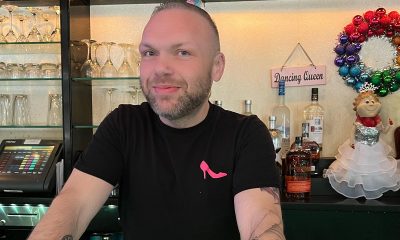Sports
Parents of gay athletes say sports brought them closer
Two local families on the powerful bond of competition
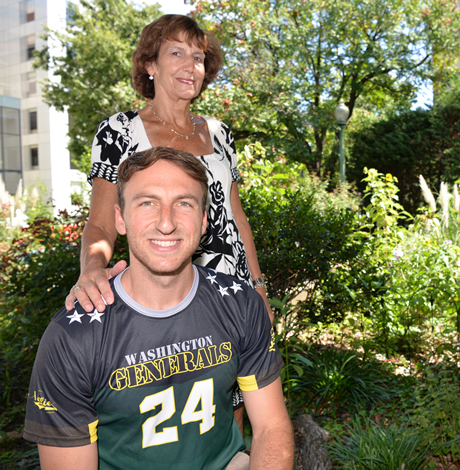
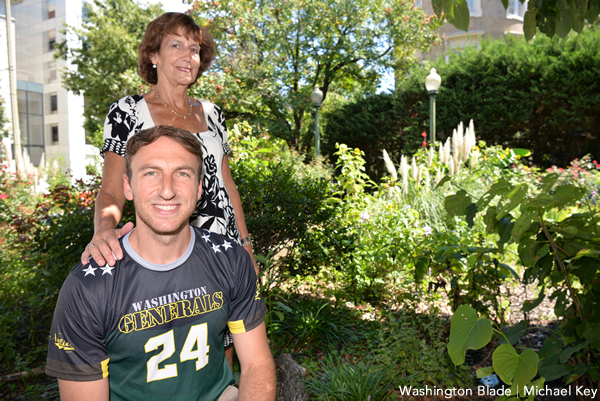
Mark and Margie Hofberg say a shared love of sports has brought them closer. (Washington Blade photo by Michael Key)
There is a family bond that occurs between parent and child when sports are a part of their everyday life. Between shuttling their children to practices, leagues, local tournaments and travel tournaments, a dynamic emerges for the parents that forms a way of life.
Sharing sports can foster a relationship that continues well into the child’s adult years. It’s a commonality that revolves around support and spending time together.
What happens when the child comes out as gay and continues to play sports? Does the dynamic change? Is it even still there?
Mark Hofberg grew up in Rockville, Md., and played multiple sports including travel-level basketball, soccer and baseball. He had a gangly phase in high school – growing one foot in a year – that relegated him to running cross country and playing frisbee and basketball recreationally while his body developed.
After coming out in his senior year of high school and growing into his 6’5” frame at the University of Maryland, Hofberg played club frisbee and any intramural sport you can think of from badminton to volleyball. He continued that through graduate school at Maryland.
Since 2012, he has been a part of the LGBT sports community in D.C. playing with the DC Gay Flag Football League, DC Pride Volleyball, Federal Triangles Soccer, DC Sentinels Basketball, Stonewall Kickball and Stonewall Dodgeball. He is in his fifth year of alternating between quarterback and captain for the Washington Generals flag football travel team.
“The LGBT sports community has given me an outlet that I need to play competitive sports,” says Hofberg. “I love it, and along with it I have found my best friends.”
Hofberg, who works in policy writing and research for an environmental nonprofit, says the person who has always been his biggest supporter is his mother, Margie Hofberg. DC Gay Flag Football is his main sport and wanting to share it with her, he asked if she would attend a game.
“She was very cautious at first, asking if I was sure she should come,” Mark Hofberg says. “Football and the league are a huge part of my life and I share everything with her. Why not share my friends?”
Margie Hofberg did indeed start coming to games and is now a regular on the sidelines along with sponsoring one of the teams through her Residential Mortgage Center. As part of her commitment as a sponsor, she runs “How to Buy a House” workshops for the players every season.
“I knew this would happen – she’s friends with more people than I am. She even goes to games when I am not there,” says Mark Hofberg, laughing. “It’s a great way for us to hang out and see each other. My dad, brother and grandfather have also been to games. I love sharing my life with my family.”
Margie Hofberg has been there all along, including coaching his youth soccer team and managing his youth baseball team.
“Whatever sport he was in, I was there supporting him and I loved every minute of it,” says Margie Hofberg. “The one thing I said when he came out to me was ‘I hope you understand you are still having my grandchildren.’”
She decided to become a sponsor of the DC Gay Flag Football League after attending Gay Bowl in Philadelphia in 2014.
“Once I saw what this community was about I wanted to become more involved and I have developed relationships beyond being Mark’s mom,” Margie Hofberg says. “Here is a group of people who are just like him and I am so glad he has an outlet to meet people. I have seen a different side of Mark emerge.”
For the Hofbergs, the sports story continues and it still revolves around support and spending time together. Margie Hofberg’s presence on the sidelines hasn’t gone unnoticed by the other players.
“I hope that seeing how Mark and I interact has helped motivate other players to start a discussion with their own family and friends,” she says. “I am so very proud of all the players in this league.”
Soccer has always been John Whitfield’s main sport and his father was a coach of his youth soccer team. When he moved on to a traveling club team, both his parents remained involved, coming to practices and games.
In his high school years in his hometown of Marysville, Wash., Whitfield played both school and club soccer and he spent two seasons playing soccer at Wartburg College. When he returned to finish his degree at Western Washington University, he continued in club and intramural soccer.
His parents had traveled to Wartburg in Iowa to see him play and the sports dynamic was still there in his collegiate years. Whitfield came out in the spring of his senior year at Western Washington.
“Soccer was always a part to focus on to separate myself from being gay. I used soccer as an excuse not to date,” says John Whitfield. “At my college graduation party, I did it all at once – came out to friends and family. I talked to a lot of people about it that day.”
He landed a job with Microsoft where he consults with the Department of Veterans Affairs, and right out of college they moved him to D.C. where Whitfield joined the Federal Triangles Soccer Club.
“My first team was very social and I stopped being afraid that playing with a gay soccer team was a gay thing,” John Whitfield says. “My two lives were finally merged together.”
Whitfield told his parents about the Federal Triangles and says they were intrigued and pleased that he was playing and meeting people. On their visits to D.C., both Debbie and Don Whitfield have attended their son’s soccer matches.
Whitfield has traveled with his team to the Gay Games and a tournament in New York. In 2016, he traveled with the Federal Triangles to the International Gay and Lesbian Football Association World Championships in Portland.
Sitting in the stands were his parents, his partner Hank, and his sister and her boyfriend. They had driven more than four hours to watch John compete. The final was played in the Portland Timbers Stadium and the Federal Triangles went on to win the world title.
“They have always been there to support me,” says John Whitfield. “Having them there to watch me play in that (MLS) stadium with my team was incredible.”
John Whitfield has two older sisters who also played soccer and their father Don was involved early on, recognizing the value in sports.
“Participating in athletics is a good learning experience for life in general,” says Don Whitfield. “When I was coaching them, it was also a good family experience. It has always been just a joy to watch my kids play.”
John advanced to the premier league at age 11 and the family experiences continued going from state to state for regional tournaments. Watching his son play continued during John’s college years.
Don Whitfield says he didn’t know that there were gay sports communities but that he is glad that they exist.
“I had seen him play in some big stadiums before Portland but it was very fun to watch him there playing at a competitive level. He is such a tough player,” Don Whitfield says. “I also enjoyed hanging out with his team afterwards when we went out for beers.”
The Whitfield family sports story remains strong and despite living on separate coasts, they continue to see each other on a regular basis.
“Before he came out, I could never put my finger on the tension because I didn’t have the tools to figure it out. Our relationship has improved dramatically because the fear is gone,” says Don Whitfield. “John is much more relaxed and my wife and I will always continue to be supportive.”
India
Anaya Bangar challenges ban on trans women in female cricket teams
Former Indian cricketer Sanjay Bangar’s daughter has received support

Anaya Bangar, the daughter of former Indian cricketer Sanjay Bangar, has partnered with the Manchester Metropolitan University Institute of Sport in the U.K. to assess her physiological profile following her gender-affirming surgery and undergoing hormone replacement therapy.
From January to March 2025, the 23-year-old underwent an eight-week research project that measured her glucose levels, oxygen uptake, muscle mass, strength, and endurance after extensive training.
The results, shared via Instagram, revealed her metrics align with those of cisgender female athletes, positioning her as eligible for women’s cricket under current scientific standards. Bangar’s findings challenge the International Cricket Council’s 2023 ban on transgender athletes in women’s cricket, prompting her to call for a science-based dialogue with the Board of Control for Cricket in India and the ICC to reform policies for transgender inclusion.
“I am talking with scientific evidence in my hand,” Bangar said in an interview posted to her Instagram page. “So, I hope, this makes an impact and I will be hoping to BCCI and ICC talking with me and discussing this further.”
On Nov. 21, 2023, the ICC enacted a controversial policy barring trans women from international women’s cricket. Finalized after a board meeting in Ahmedabad, India, the regulation prohibits any trans player who has experienced male puberty from competing, irrespective of gender-affirming surgery or hormone therapy. Developed through a 9-month consultation led by the ICC’s Medical Advisory Committee, the rule aims to safeguard the “integrity, safety, and fairness” of women’s cricket but has drawn criticism for excluding athletes like Canada’s Danielle McGahey, the first trans woman to play internationally. The policy, which allows domestic boards to set their own rules, is slated for review by November 2025.
Bangar shared a document on social media verifying her participation in a physiological study at the Manchester Metropolitan University Institute of Sport, conducted from Jan. 20 to March 3, 2025, focused on cricket performance. The report confirmed that her vital metrics — including haemoglobin, blood glucose, peak power, and mean power — aligned with those of cisgender female athletes. Initially, her fasting blood glucose measured 6.1 mmol/L, slightly above the typical non-diabetic range of 4.0–5.9 mmol/L, but subsequent tests showed it normalized, reinforcing the study’s findings that her physical profile meets female athletic standards.
“I am submitting this to the BCCI and ICC, with full transparency and hope,” said Bangar. “My only intention is to start a conversation based on facts not fear. To build space, not divide it.”
In a letter to the BCCI and the ICC, Bangar emphasized her test results from the Manchester Metropolitan University study. She explained that the research aimed to assess how hormone therapy had influenced her strength, stamina, haemoglobin, glucose levels, and overall performance, benchmarked directly against cisgender female athletic standards.
Bangar’s letter to the BCCI and the ICC clarified the Manchester study was not intended as a political statement but as a catalyst for a science-driven dialogue on fairness and inclusion in cricket. She emphasized the importance of prioritizing empirical data over assumptions to shape equitable policies for trans athletes in the sport.
Bangar urged the BCCI, the world’s most influential cricket authority, to initiate a formal dialogue on trans women’s inclusion in women’s cricket, rooted in medical science, performance metrics, and ethical fairness. She called for the exploration of eligibility pathways based on sport-specific criteria, such as haemoglobin thresholds, testosterone suppression timelines, and standardized performance testing. Additionally, she advocated for collaboration with experts, athletes, and legal advisors to develop policies that balance inclusivity with competitive integrity.
“I am releasing my report and story publicly not for sympathy, but for truth. Because inclusion does not mean ignoring fairness, it means measuring it, transparently and responsibly,” said Bangar in a letter to the BCCI. “I would deeply appreciate the opportunity to meet with you or a representative of the BCCI or ICC to present my findings, discuss possible policy pathways, and work towards a future where every athlete is evaluated based on real data, not outdated perceptions.”
Before her transition, Bangar competed for Islam Gymkhana in Mumbai and Hinckley Cricket Club in the U.K., showcasing her talent in domestic cricket circuits. Her father, Sanjay Bangar, was a dependable all-rounder for the Indian national cricket team from 2001 to 2004, playing 12 test matches and 15 One Day Internationals. He later served as a batting coach for the Indian team from 2014 to 2019, contributing to its strategic development.
Cricket in India is a cultural phenomenon, commanding a fanbase of more than 1 billion, with more than 80 percent of global cricket viewership originating from the country.
The International Cricket Council, the sport’s governing body, oversees 12 full member nations and more than 90 associate members, with the U.S. recently gaining associate member status in 2019 and co-hosting the 2024 ICC Men’s T20 World Cup. The BCCI generated approximately $2.25 billion in revenue in the 2023–24 financial year, primarily from the Indian Premier League, bilateral series, and ICC revenue sharing. The ICC earns over $3 billion from media rights in India alone for the 2024–27 cycle, contributing nearly 90 percent of its global media rights revenue, with the BCCI receiving 38.5 percent of the ICC’s annual earnings, approximately $231 million per year.
Women’s cricket in India enjoys a growing fanbase, with over 300 million viewers for the Women’s Premier League in 2024, making it a significant driver of the sport’s global popularity. The International Cricket Council oversees women’s cricket in 12 full member nations and over 90 associate members, with the U.S. fielding a women’s team since gaining associate status in 2019 and competing in ICC events like the 2024 Women’s T20 World Cup qualifiers. The BCCI invests heavily in women’s cricket, allocating approximately $60 million annually to the WPL and domestic programs in 2024–25, while contributing to the ICC’s $20 million budget for women’s cricket development globally. India’s media market for women’s cricket, including WPL broadcasting rights, generated $120 million in 2024, accounting for over 50 percent of the ICC’s women’s cricket media revenue.
“As a woman, I feel when someone says that they are women, then they are, be trans or cis. A trans woman is definitely the same as a cis woman emotionally and in vitals, and specially, when someone is on hormone replacement therapy. Stopping Anaya Bangar from playing is discrimination and violation of her rights. It is really sad and painful that every transwoman need to fight and prove their identity everywhere,” said Indrani Chakraborty, an LGBTQ rights activist and a mother of a trans woman. “If ICC and BCCI is stopping her from playing for being transgender, then I will say this to be their lack of awareness and of course the social mindsets which deny acceptance.”
Chakraborty told the Blade that Bangar is an asset, no matter what. She said that the women’s cricket team will only benefit by participation, but the discriminating policies are the hindrance.
“Actually the transgender community face such discrimination in every sphere. In spite of being potent, they face rejection. This is highly inhuman. These attitudes is regressive and will never let to prosper. Are we really in 2025?,” said Chakraborty. “We, our mindset and the society are the issues. We, as a whole, need to get aware and have to come together for getting justice for Anaya. If today, we remain silent, the entire community will be oppressed. Proper knowledge of gender issues need to be understood.”
The BCCI and the International Cricket Council have not responded to the Blade’s repeated requests for comment.
Sports
English soccer bans transgender women from women’s teams
British Supreme Court last month ruled legal definition of woman limited to ‘biological women’
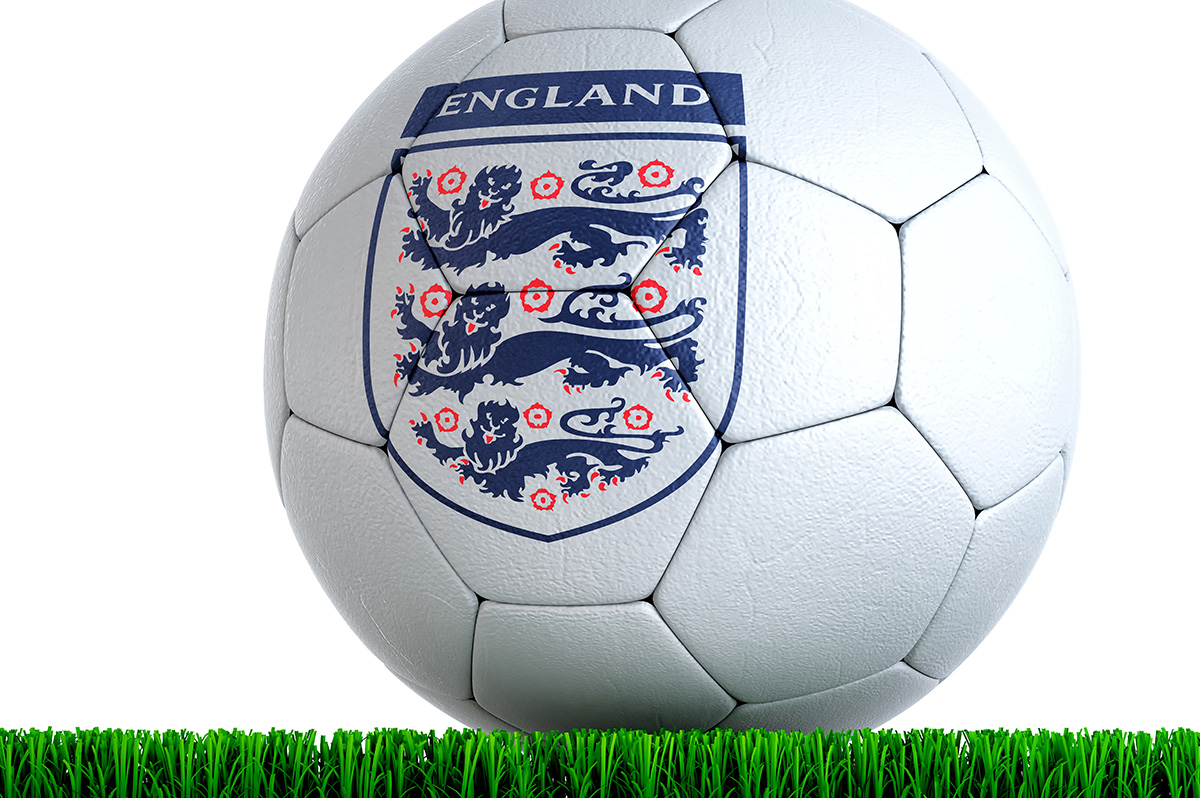
The organization that governs English soccer on Thursday announced it will no longer allow transgender women to play on women’s teams.
The British Supreme Court on April 16 ruled the legal definition of a woman is limited to “biological women” and does not include trans women. The Football Association’s announcement, which cites the ruling, notes its new policy will take effect on June 1.
“As the governing body of the national sport, our role is to make football accessible to as many people as possible, operating within the law and international football policy defined by UEFA (Union of European Football Associations) and FIFA,” said the Football Association in a statement that announced the policy change. “Our current policy, which allows transgender women to participate in the women’s game, was based on this principle and supported by expert legal advice.”
“This is a complex subject, and our position has always been that if there was a material change in law, science, or the operation of the policy in grassroots football then we would review it and change it if necessary,” added the Football Association.
The Football Association also acknowledged the new policy “will be difficult for people who simply want to play the game they love in the gender by which they identify.”
“We are contacting the registered transgender women currently playing to explain the changes and how they can continue to stay involved in the game,” it said.
The Football Association told the BBC there were “fewer than 30 transgender women registered among millions of amateur players” and there are “no registered transgender women in the professional game” in England, Scotland, Wales, and Northern Ireland.
The Scottish Football Association, which governs soccer in Scotland, is expected to also ban trans women from women’s teams.
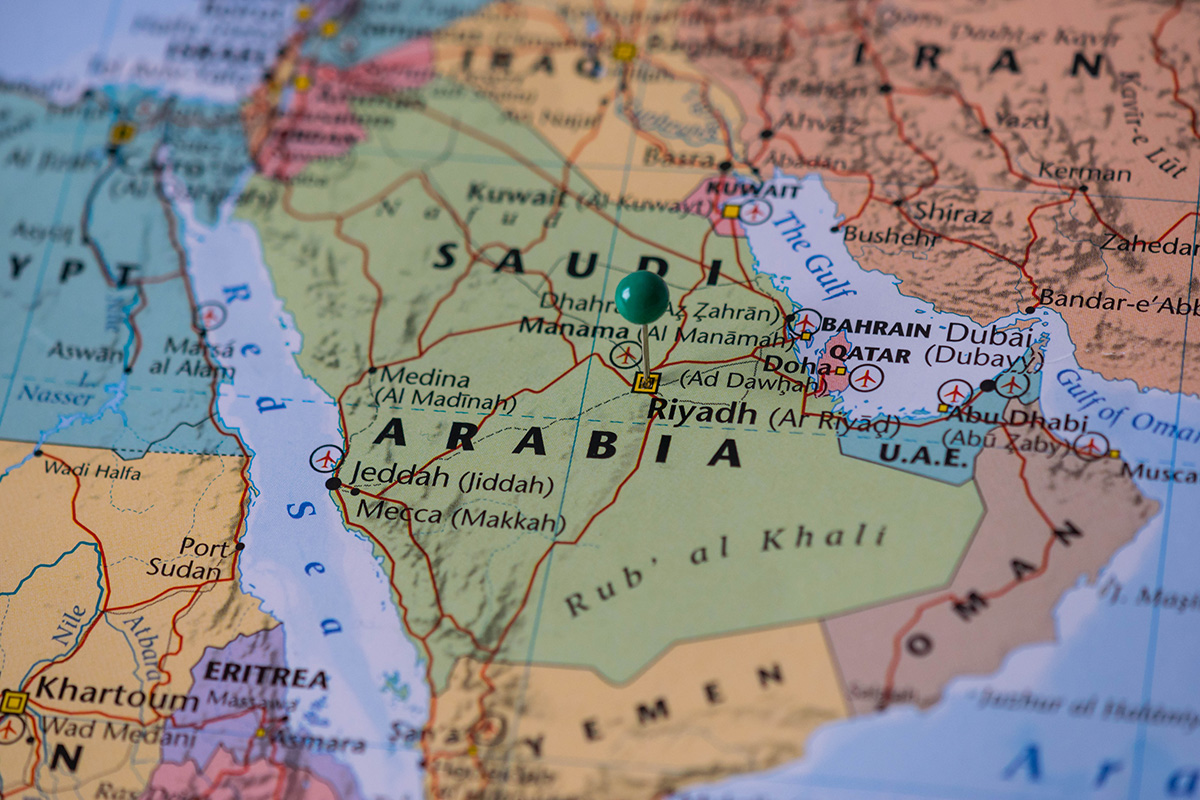
FIFA has announced Saudi Arabia will host the 2034 World Cup, despite concerns over its human rights record that includes the death penalty for homosexuality.
The Associated Press reported FIFA confirmed the decision on Dec. 18. The AP noted Saudi Arabia is the only country that bid to host the 2034 World Cup.
“This is a historic moment for Saudi Arabia and a dream come true for all our 32 million people who simply love the game,” said Sport Minister Prince Abdulaziz bin Turki Al- Faisal, who is also president of the Saudi Olympic and Paralympic Committee, in a statement the Saudi Press Agency posted to its website.
Saudi Arabia is among the handful of countries in which consensual same-sex sexual relations remain punishable by death.
A U.S. intelligence report concluded Saudi Crown Prince Mohammed bin Salman “likely approved” the murder of Jamal Khashoggi, a Washington Post columnist, inside the Saudi Consulate in Istanbul in 2018. A federal judge in 2022 dismissed a lawsuit against Prince Mohammed after the Biden-Harris administration said he was immune to the lawsuit because he is the country’s prime minister.
Human rights activists have also criticized the Saudi government over the treatment of women, migrant workers, and other groups in the country.
“No one should be surprised by this,” Cyd Zeigler, Jr., co-founder of Outsports.com, an LGBTQ sports website, told the Washington Blade in an email after FIFA confirmed Saudi Arabia will host the 2034 World Cup. “FIFA, the International Olympic Committee, and many other world governing bodies routinely turn to authoritarian countries with terrible human-rights records to host major sporting events. There are simply few other countries willing to spend the billions of dollars it takes to build the needed infrastructure.”
Peter Tatchell, a long-time LGBTQ activist from the U.K. who is director of the Peter Tatchell Foundation, in a statement described FIFA’s decision as “a betrayal of the values that football should stand for: Inclusivity, fairness, and respect for human rights.”
“This is not about football; it’s about sportswashing,” said Tatchell. “The Saudi regime is using the World Cup to launder its international image and distract from its brutal abuses. By granting them this platform, FIFA is complicit in whitewashing their crimes.”
Qatar, which borders Saudi Arabia, hosted the 2022 World Cup.
Consensual same-sex sexual relations remain criminalized in Qatar.
“Saudi Arabia was the only country to bid for the 2034 FIFA World Cup,” said Zeigler. “So, until FIFA, the IOC (International Olympic Committee) and other governing bodies ban major human-rights violators from hosting, we’ll continue to see events like this in Saudi Arabia, China, Qatar, and other countries with terrible LGBTQ rights issues.”
The Blade has reached out to FIFA and the Saudi government for comment.
-

 U.S. Supreme Court4 days ago
U.S. Supreme Court4 days agoSupreme Court upholds ACA rule that makes PrEP, other preventative care free
-

 U.S. Supreme Court4 days ago
U.S. Supreme Court4 days agoSupreme Court rules parents must have option to opt children out of LGBTQ-specific lessons
-

 District of Columbia5 days ago
District of Columbia5 days agoMan sentenced to 15 years in prison for drug deal that killed two DC gay men
-

 Federal Government5 days ago
Federal Government5 days agoWhite House finds Calif. violated Title IX by allowing trans athletes in school sports


